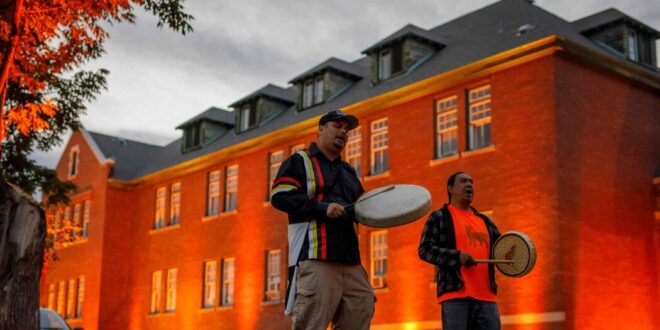It’s been impossible to avoid the sadness and shock descended on Canada following the horrific discovery of remains by the Tk’emlups te Secwepemc First Nation at the Kamloops Indian Residential School.
For a lot of people, the discovery at Kamloops of the remains of 215 Indigenous children will be top of mind for a long time. So when the world gathers (virtually) in Ottawa for the International Indigenous Music Summit on Tuesday, it will be a part of the conversation.
I spoke with ShoShana Kish, an Anishinaabewe musician and the founder of the summit.
“This week, we just hit the brakes hard,” she told me outside the National Arts Centre in Ottawa, where the five-day summit will be based. “We needed to pause together, we needed a moment to process because there’s this unearthing of grief for all of us.”
Amanda Rheaume, a Métis musician based in Ottawa who is the summit’s operations manager, told me that after consultation with elders, the virtual gathering will include ceremonies to commemorate the children, including starting each day with 2 minutes and 15 seconds of silence.
“What we’re moving through as a community is not just one thing,” Ms. Kish said. “Our communities all have stories of mass graves of children. Having that kind of terrible truth dismissed for all of these decades is its own kind of pain.”
The idea of bringing Indigenous musicians together first came to Ms. Kish, who performs with her husband, Raven Kanatakta, as the band Digging Roots, while performing in Australia.
“The colonial experience is not unique to Canada,” she said. “There’s something really powerful in being able to share those stories and histories. We’re coming together around our artistry and the creative, innovative things people are doing in their communities all over the world to revitalize language, to keep their stories strong and to keep their traditions strong.”
With help initially from the Folk Alliance International, the first summit was in Montreal. The second, in New Orleans, squeaked through just before the pandemic shutdown.
The summit isn’t a music festival. Instead, it’s a series of workshops and panels on, among other things, making money in the age of streaming and developing links between Black and Indigenous musicians.
But 150 or so musicians aren’t going to get together without there being music. Performances will take the form of videos, with 16 of them being short documentaries. As well as Indigenous people from Canada, the lineup includes performers from Sweden, the United States, Latin America and Australia.
The move to video from live performances did have one bonus. The short documentaries, directed by Sarain Fox, who is from the Batchewana First Nation, are almost as much about the musicians’ home as their music.
After the summit ends on June 12, the videos will be available for everyone to view on its website. After previewing four of them, I can’t wait to watch the entire series.
Planning for next year is already underway. It will be in Ottawa and, everyone trusts, in person.
Ms. Kish said that Canada’s Indigenous music scene in some ways showed that the residential school system failed in its assimilation objective.
“We’re still here,” she said. “And we’re beautiful and strong and we’re also hurting right now.”
-
Dan Bilefsky looks into a medical mystery: Over the last six years, 48 people in New Brunswick have come down with a mix of symptoms including insomnia, impaired motor function and hallucinations such as nightmarish visions of the dead. So far, doctors are baffled about the cause.
-
The only way to reach Minnesota’s Northwest Angle without passing through Canada is by water on Lake of the Woods or by seaplane. Mitch Smith reports that people behind the small, family-owned resorts on the Angle are pushing for restrictions at the border between Canada and the United States to be lifted just enough to allow their American customers to travel along a 66-kilometer gravel road through Canada. There’s little to indicate that will happen any time soon.
-
The few hundred remaining North Atlantic right whales are not only struggling to survive, but new research shows that they are also shrinking. Entanglement in fishing gear is an ever-present threat for the mammals in their migration routes and feeding grounds in Canada and the United States.
-
Following a recommendation from the National Advisory Committee on Immunization, most provinces are moving to allow Canadians to mix vaccines.
A native of Windsor, Ontario, Ian Austen was educated in Toronto, lives in Ottawa and has reported about Canada for The New York Times for the past 16 years. Follow him on Twitter at @ianrausten.
How are we doing?
We’re eager to have your thoughts about this newsletter and events in Canada in general. Please send them to nytcanada@nytimes.com.
Like this email?
Forward it to your friends, and let them know they can sign up here.
 Top Naija News: Nigerian News, Breaking News Nigeria and World News Top Naija News is a daily news publication in Nigeria, delivering the latest breaking news in Nigeria and around the world.
Top Naija News: Nigerian News, Breaking News Nigeria and World News Top Naija News is a daily news publication in Nigeria, delivering the latest breaking news in Nigeria and around the world.




